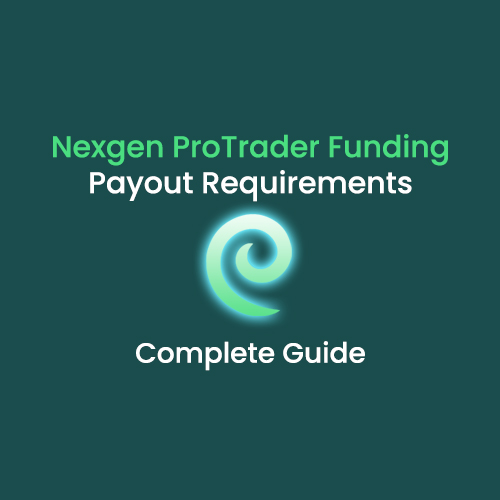What is a Prop Firm? A Complete Beginner's Guide to Proprietary Trading 📈
Have you ever dreamed of becoming a professional trader but didn't have the money to get started? Or maybe you have the skills but lack the capital to leverage bigger gains? Enter the world of prop firms (short for proprietary trading firms), where traders can use a company's money to trade and share the profits. Prop firms give you the chance to trade with significant capital without risking your own funds. If you’re ready to explore how this all works, let’s dive right in! 🚀
Did you know you can save money on prop firm evaluations? Use code SOPF to get a discount when signing up! This could help you reduce upfront costs and make joining a prop firm more affordable.
👀 What Exactly is a Prop Firm?
A prop firm (or proprietary trading firm) is a company that allows skilled traders to trade using the firm's capital. Instead of trading with their own money, traders are given access to a funded account after passing a series of tests or evaluations. In return, traders share a portion of the profits with the firm.
In simpler terms: you trade, they fund, and you split the profits! 💰
Unlike hedge funds, which manage other people’s money, prop firms trade using their own money. They make profits based on the market gains achieved by the traders they hire.
💡 How Does a Prop Firm Work?
Most prop firms follow a similar model: you pass a test, get funded, and share the profits you make. Here’s a breakdown of the step-by-step process:
Pay and Take an Evaluation: Many prop firms require you to pay a fee to take an evaluation. The evaluation phase is a way for them to test if you have what it takes to manage their capital without taking on too much risk. You may trade in a simulated environment where your trading is tracked to determine if you qualify to move on.
Prove Your Skills: During this stage, you typically have to meet a profit target while staying within certain risk parameters. Some prop firms use simulated accounts initially, which look and feel like real trading but involve no actual money. This lets firms evaluate your consistency and risk management without risking their capital.
Get Funded with Live or Simulated Capital: Once you pass, you get access to a funded account. Depending on the firm, this may still be a simulated account but with real profit potential. For example, firms like My Funded Futures start traders with simulated accounts to manage risk before moving them to live accounts once they show consistency 😉. Once you're in a live account, your trades have real financial impacts, both for you and the firm.
Profit Sharing: After meeting certain profit and consistency milestones, you can take a payout from your profits. Different firms have different payout schedules and profit splits—some allow traders to keep as much as 80-90% of the profits they generate!
🌱 Why Trade with a Prop Firm?
There are several reasons why joining a prop firm might be the best path for aspiring traders. Let’s explore some of the key benefits:
1. No Personal Capital at Risk
One of the biggest advantages of trading with a prop firm is that you don’t risk your own money. By using the firm’s capital, your financial risk is significantly reduced. If you make a mistake, it’s the firm's money that takes the loss, not your personal savings. The only cost you might face is the evaluation and funded account fees, which means the risk is limited to these minimal fees while still allowing you to access significant trading capital.
2. Access to Larger Capital
Prop firms provide you with much more buying power compared to what most retail traders can afford on their own. Firms like Apex Trader Funding offer funded accounts ranging from $25,000 to $300,000. The more capital you manage, the greater your potential profits 🌟.
3. Payout Opportunities
Once you’ve proven yourself, you can take payouts based on the profits you generate. Some firms, like BluSky Trading Company, offer 90% profit splits after meeting certain targets, which can be highly rewarding for skilled traders 💸.
4. Mentorship and Training
Many prop firms provide structured training, mentorship programs, and access to trading communities. These resources can help you refine your skills, develop effective strategies, and grow your trading career.
🔎 Types of Prop Firm Evaluations
Prop firms use evaluations to assess traders' skills and risk management abilities before providing access to significant capital. These evaluations can vary in structure, and here are the key types you might encounter:
One-Step vs. Two-Step Evaluations
One-Step Evaluation: Some prop firms use a straightforward one-step evaluation where traders need to meet specific profit targets while adhering to strict risk parameters. This is often a quicker way to qualify for a funded account.
Two-Step Evaluation: Other firms employ a two-step process, which involves a more thorough assessment of a trader's ability to maintain consistent performance over time. This process may require meeting multiple profit goals while staying within defined risk limits.
Risk Parameters and Trading Rules
During the evaluation, traders are required to adhere to certain risk parameters, such as:
Drawdown Limits: Prop firms may impose different types of drawdown limits to manage risk effectively, such as end-of-day drawdown (limits losses by the end of a trading day), trailing drawdown (moves up as profits increase but does not decrease when profits drop), or static drawdown (a fixed maximum loss limit that remains constant). These drawdown rules help ensure traders maintain discipline and manage losses effectively.
Daily Loss Limits: Maximum allowable losses in a single day to keep risk under control.
Consistency Requirements: Many firms also require consistent gains over time rather than relying on one or two big wins to pass the evaluation.
Evaluation Account vs. Funded Account
Evaluation Account: Most firms, including Bulenox, start traders in a evaluation account to test their skills. These accounts replicate real market conditions and help determine if traders are ready to move forward.
Funded Account: After passing the evaluation stage, traders can advance to a funded account. Depending on the firm, this could be a simulated account with real profit payouts or an actual live account where trades are executed in the real market. This allows traders to earn while proving they can manage a funded account effectively.
📢 Key Things to Look for in a Prop Firm
When choosing a prop firm, there are several factors to consider to ensure you make the best choice for your trading career.
1. Reputation & Transparency
Look for prop firms that are well-reviewed by other traders and have a solid reputation. You want to ensure the firm pays on time and has a transparent evaluation process. Tradeify, for example, has gained a positive reputation for their structured funding programs and high profit splits.
2. Capital Access & Profit Split
Consider how much capital you’ll be given and what percentage of profits you can keep. A high profit split (such as 90/10) is preferable, as it means you keep the majority of what you earn 💵.
3. Fee Structure
Understanding the fee structure of a prop firm is crucial before getting started. Prop firms typically charge various fees, including evaluation fees, funded account fees, commissions, and data fees. For instance, Apex Trader Funding charges a monthly fee during the evaluation phase, and once funded, traders can opt for either monthly or lifetime fees for their funded accounts. Being aware of these costs upfront ensures you can plan and budget effectively for your trading journey.
4. Support & Resources
If you’re just starting out, it’s helpful to choose a firm that offers training and mentorship. This will ensure you get the support you need to grow as a trader and avoid common mistakes.
📊 Pros and Cons of Prop Firms
While there are numerous benefits to trading with a prop firm, there are also a few things to consider before you jump in.
Pros:
No personal capital at risk
Access to high amounts of trading capital
Potential for mentorship and professional growth
High profit splits (up to 90%)
Cons:
Evaluation fees: You need to pay to take the evaluation, and there is always a risk of not passing, which can be a significant challenge for some traders.
Payout limitations: Some firms limit the frequency or amount of payouts, which can affect your cash flow if you need regular income.
Pressure to perform: Trading with a firm’s money means there are expectations, and there’s added pressure to meet targets and minimize losses.
Additional trading rules: Many prop firms enforce strict trading rules, such as prohibiting trading during major news events or not allowing dollar cost averaging. These rules can limit your trading strategies and require you to adapt to their specific guidelines.
🥇 Are Prop Firms Worth It?
If you have the trading skills but lack the capital to leverage those skills into significant gains, then joining a prop firm can be an excellent opportunity. It allows you to gain experience, manage larger sums of money, and receive mentorship from experienced traders, all while minimizing your own risk 🌟.
However, it’s not for everyone. The evaluation process can be challenging, and there’s a lot of pressure to perform well to maintain access to the funded account. But if you’re serious about trading and confident in your abilities, a prop firm could be your ticket to trading at a higher level.
📃 Conclusion: Prop Firms as a Gateway to Trading Success
Prop firms offer a unique and accessible way to get into the world of trading without risking your own money. With the possibility of gaining access to significant capital, getting paid well for your performance, and even receiving training, they are a great option for many aspiring traders. However, success with a prop firm requires discipline, strong risk management skills, and consistency.
So, if you’re ready to take your trading to the next level, a prop firm could be the opportunity you’ve been waiting for! 🙌
And don’t forget, you can save on your journey to becoming a funded trader by using code SOPF to get a discount on prop firm evaluations. Take advantage of this to reduce your costs and start trading sooner!

Best Nexgen ProTrader Funding Discount Code
Complete guide to the SOPF discount code for Nexgen ProTrader Funding. Learn how to save up to 90% on evaluations, when sales run, and how to apply the code.

Best Alpha Futures Discount Code
Save on Alpha Futures evaluations with discount code SOPF. Complete pricing breakdown for all plans, activation fee details, step-by-step application guide, and promotional calendar. Get the best deal on your trading evaluation.

Nexgen ProTrader Funding Payout Requirements Guide
Complete guide to Nexgen ProTrader Funding payout requirements. Learn the 8 trading days rule, 30% consistency calculation, $600 buffer minimums, profit split progression from 90% to 100%, and how to avoid common payout mistakes that delay withdrawals.

